Perfect Espresso: A Bean Selection Guide
The Journey to the Perfect Espresso: Choosing the Right Beans
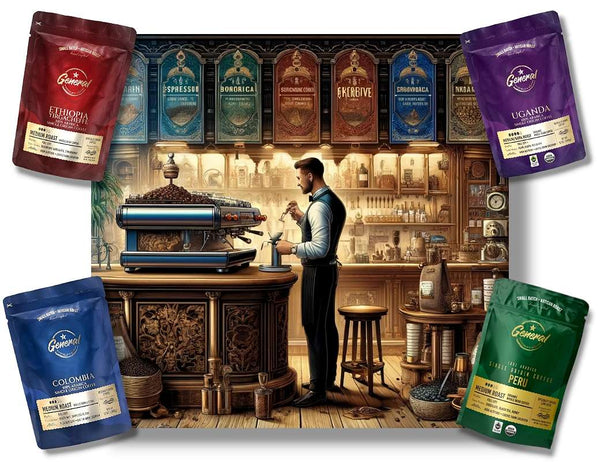
If you're a coffee lover seeking the perfect espresso, this guide will help you select the ideal beans—whether you prefer bold, robust flavors or a more delicate, nuanced taste. At General Warfield’s Coffee, we understand the importance of finding the ideal bean. That's why we carefully select and roast beans from around the world, ensuring every cup—whether coffee or espresso—is a masterpiece.
Our brand is known for its commitment to quality, exceptional taste, and dedication to organic, fair trade practices. Explore our selection of organic fairtrade and single-origin coffees, all roasted medium to medium-dark for your enjoyment.
Join us as we delve into the different types of coffee beans, their flavor profiles, and how to determine the perfect match for your espresso machine. We’ll provide expert tips on storage and grinding to ensure your beans stay fresh and flavorful.
Get ready to embark on a flavorful adventure as we introduce you to the world of espresso beans. Let's uncover the secrets to creating the perfect cup of espresso that will leave your taste buds craving for more. As a brand committed to specialty-grade coffee, General Warfield’s proudly draws on the rich history of espresso, a brewing method born in Italy at the start of the 20th century.
What is the History of Espresso Coffee?

Luigi Bezzera’s invention of the espresso machine in 1901 transformed the coffee world, allowing for a much faster brew by introducing high pressure—a method that quickly became a cultural staple in Italian cafes. This innovation was later popularized by Desiderio Pavoni, who began manufacturing espresso machines for commercial use, making espresso a staple in Italian cafes.
As espresso gained popularity, it spread across Europe and became synonymous with café culture. It not only represented a fast, concentrated coffee experience but also paved the way for other beloved drinks like lattes and cappuccinos. Espresso’s influence eventually reached coffee lovers around the world, evolving into the global phenomenon we know today.
General Warfield’s Coffee and Espresso
At General Warfield’s Coffee, we uphold the tradition and excellence of espresso with our specialty-grade, handpicked Arabica beans. Our selection, which includes an array of single-origin Peruvian, Ugandan, and Colombian to Ethiopian Yirgacheffe beans, brings the artistry and precision of espresso into your home. Whether you’re brewing a traditional Italian-style espresso or crafting your favorite espresso-based drinks, our beans provide the perfect foundation for a bold, flavorful experience.
Summary of Espresso's Evolution:
- Coffee Origins and Invention
- Spread and Popularity
- Impact on Coffee Culture
- Modern Espresso
Understanding the Importance of Choosing the Right Beans for an Espresso Shot
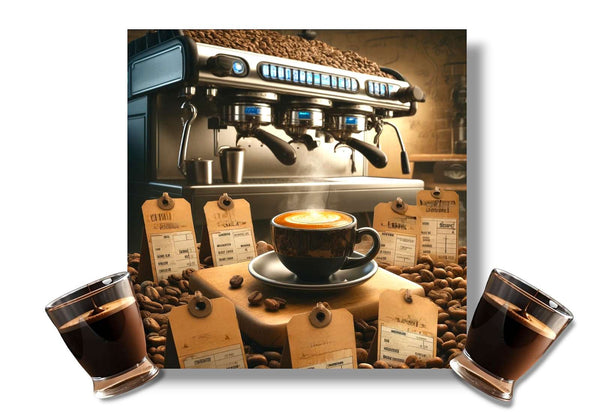
The journey to the perfect espresso starts with understanding the importance of choosing the right beans. The beans you select will greatly impact the taste and aroma of your coffee. The quality, origin, and roast level all play a significant role in determining the flavor profile of your espresso.
At General Warfield’s Coffee, we carefully select only specialty-grade beans, offering you a diverse selection that includes fairtrade and organic whole beans sourced from some of the most respected and trusted micro-lot farms in the world, all achieving specialty grade status. Our roasts, ranging from medium to medium-dark, are meticulously chosen to bring out the optimal flavors of the beans, ensuring that each cup of espresso you brew is a masterpiece of taste and quality.
When choosing espresso beans, it’s crucial to select those that can withstand the high pressure and intense heat of the brewing process. Ideal beans produce a balanced flavor and a rich crema—the golden, creamy layer that crowns a well-made espresso. Selecting the right beans can highlight specific characteristics in your coffee, from smooth and chocolatey notes to bright and fruity acidity.
To achieve the best results, choosing freshly roasted beans is essential—a standard that General Warfield’s Coffee proudly upholds. Coffee beans deliver their peak flavor within a few weeks of roasting. To preserve this freshness, avoid pre-ground beans, which quickly lose their flavor. Instead, select whole beans and grind them just before brewing to capture the maximum taste and aroma.
Now, let's discuss what type of coffee beans can be used to make a perfect espresso shot.
What Types of Beans Are Used for Espresso Coffee?
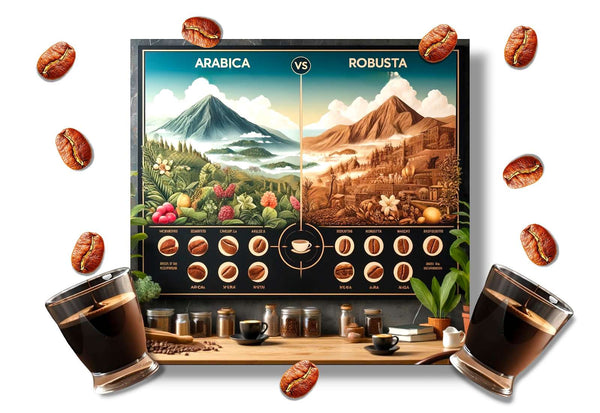
Espresso coffee can be made using different types of beans, each with its own unique flavor profile. The two most common types are Arabica and Robusta. Understanding the differences between these beans will help you make an informed decision when selecting the perfect match for your espresso machine.
- Arabica Beans from (Coffea arabica plant)
Arabica beans are the most popular choice for espresso due to their superior quality and delicate flavors. These beans are grown at higher altitudes, which contributes to their complexity and acidity. Arabica beans are known for their fruity, floral, and sometimes nutty flavors. They often have a smoother and sweeter taste compared to Robusta beans.
- Robusta Beans from (Coffea canephora plant)
Robusta beans, as the name suggests, are known for their robust and strong flavor. These beans have a higher caffeine content and a more bitter taste compared to Arabica beans. Robusta beans are often used in espresso blends to add body and crema. They are also more resistant to pests and diseases, making them easier to cultivate.
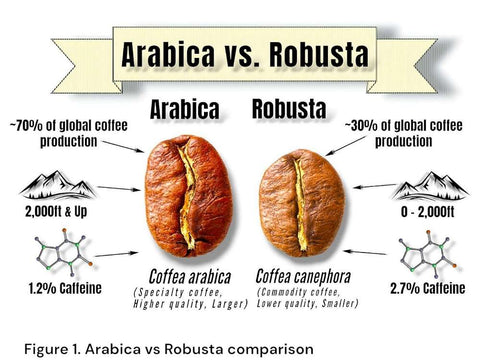
When choosing between Arabica and Robusta beans, consider your personal preference for flavor and intensity. If you enjoy a milder and more nuanced espresso, Arabica beans are the way to go. However, if you prefer a stronger and bolder cup of coffee, Robusta beans might be more suitable.
At General Warfield’s Coffee, our selection features some of the finest Arabica beans: organic fairtrade whole beans from Peru and Uganda, as well as single-origin Colombian and Ethiopian Yirgacheffe roasts, and a specialty-grade blend of Guatemalan and Brazilian coffees. Renowned for their superior quality, these beans deliver delicate flavors, perfect for those who appreciate a smoother and sweeter taste in their espresso. Each variety contributes unique notes—from floral and citrus to rich chocolate—ensuring a sophisticated and satisfying coffee experience.
Next, let's take a look at the caffeine content in an espresso shot.
How Much Caffeine Is in an Espresso Shot?
When discussing how much caffeine is in an espresso shot, it’s essential to recognize that a single shot of espresso typically contains anywhere from 63 to 100 milligrams of caffeine. Several factors influence this range, including the type of coffee beans (Arabica vs. Robusta), the grind size, the coffee-to-water ratio, and the brewing time. Generally, espresso is known for its concentrated caffeine content, but it’s important to understand that despite its bold flavor, it may contain less caffeine than a regular cup of drip coffee due to the smaller serving size.
At General Warfield’s Coffee, we use premium specialty-grade Arabica beans, which naturally contain less caffeine compared to Robusta beans. An espresso shot made from our Fair Trade and USDA Organic Certified Arabica beans, like our Single-Origin Peruvian or Ethiopian Yirgacheffe, will typically have a smoother, more refined flavor with moderate caffeine content, ranging around 63 to 75 milligrams per shot. While Robusta beans contain more caffeine, they often come with a more bitter and less nuanced flavor, making them less desirable for those seeking a premium coffee experience.
For those wondering how much caffeine is in an espresso shot when choosing high-quality Arabica beans, it’s worth noting that you can enjoy the rich, full-bodied flavors without the higher caffeine levels associated with Robusta beans. The exact caffeine content also depends on the grind size and extraction process, which is why using freshly ground whole beans, like those from General Warfield’s Coffee, ensures optimal flavor and consistent caffeine levels in every shot.
Whether you're looking for a bold pick-me-up or a more balanced and moderate espresso experience, understanding the caffeine levels in an espresso shot helps you tailor your coffee ritual to suit your needs, offering both a delightful taste and just the right amount of caffeine.
This makes espresso a versatile option for both coffee enthusiasts who prefer a strong espresso and those who want a flavorful shot with a moderate caffeine boost. It is important to know which beans will align with your preference to make the perfect espresso shot for you.
Factors to Consider When Selecting Espresso Beans
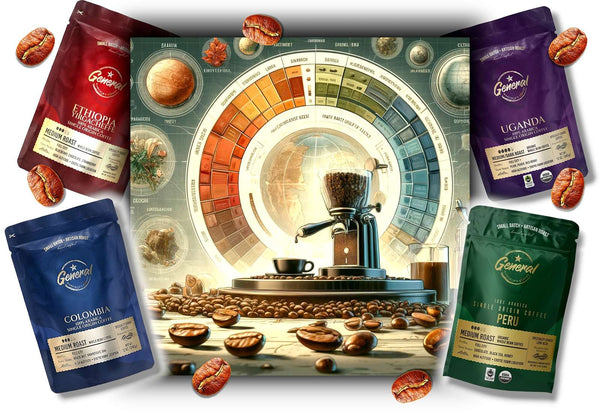
Selecting the perfect beans for your espresso goes beyond choosing between Arabica and Robusta. Several factors come into play when determining the ideal match for your taste preferences and brewing method. Here are some key considerations to keep in mind:
- Flavor Profile
Consider the flavor profile you desire in your espresso. Do you enjoy a bright and acidic taste, or do you prefer a more balanced and chocolatey flavor? Different beans and roasts will offer varying flavor profiles, so it's essential to identify your preferences before making a selection.
- Roast Level
The roast level of the beans has a significant impact on the flavor of your espresso. Lighter roasts tend to retain more of the beans' natural flavors, resulting in a brighter and more acidic cup. On the other hand, darker roasts bring out bolder and smokier flavors. Experiment with different roast levels to find the perfect balance for your palate.
- Origin
Coffee beans are grown in various regions around the world, each with its own unique terroir and flavor characteristics. Consider exploring beans from different origins to experience the diverse flavors they offer. Whether it's the fruity and floral notes of beans from Ethiopia or the earthy and chocolatey undertones of beans from Brazil, each origin brings something special to your espresso.
- Blend or Single-Origin
Decide if you prefer a blend of beans or a single-origin variety. Blends offer a harmonious combination of flavors, with each bean contributing its unique characteristics. Single-origin beans, on the other hand, showcase the distinct flavors of a specific region. Experiment with both options to find your preferred style of espresso.
- Caffeine Content
- Budget
Consider your budget when selecting espresso beans. Specialty beans can be more expensive, but they often offer exceptional quality and unique flavors. If you're on a tight budget, there are still plenty of options available that deliver great taste without breaking the bank. Don't be afraid to explore different brands and price ranges to find your perfect match.
By considering these factors, you can narrow down your options and find the beans that best suit your taste preferences and brewing method. Remember, the journey to the perfect espresso is all about experimentation and discovering what works best for you.
Now that we’ve explored the key factors in bean selection, let’s dive deeper into how the roasting process affects those all-important flavors.
The Roasting Process and Its Impact on Flavor
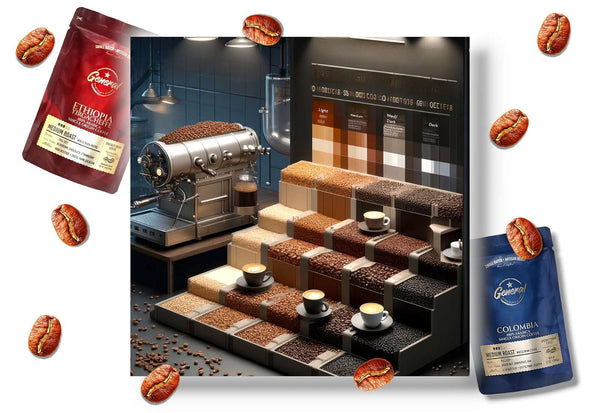
The roasting process is a crucial step in the production of espresso beans. It not only determines the color and appearance of the beans but also plays a significant role in developing their flavor profiles. Understanding the different roast levels will help you choose beans that align with your taste preferences, especially if you're seeking the best roast level for espresso:
- Light Roast
Lightly roasted beans are typically light brown in color and have a more pronounced acidity. The flavors of the beans are more delicate and nuanced, allowing the natural characteristics of the coffee to shine through. Light roasts are often preferred by those who enjoy a brighter and more acidic espresso.
- Medium Roast
Medium-roasted beans have a darker brown color and offer a balance between acidity and richness. The flavors are slightly more developed compared to light roasts, with hints of sweetness and a fuller body. Medium roasts are a popular choice for espresso, as they provide a well-rounded flavor profile.
- Dark Roast
Darkly roasted beans are dark brown to almost black in color. They have a more robust and smoky flavor, with reduced acidity. Dark roasts often exhibit caramelization and notes of chocolate, making them a favorite for those who prefer a bold and intense espresso. However, it's important to note that a dark roast can sometimes overpower the natural flavors of the beans.
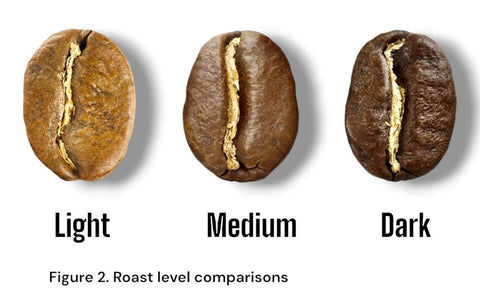
When choosing the roast level for your espresso beans, consider the desired flavor profile and your brewing method. Lighter roasts are often recommended for manual brewing methods like pour-over or French press, as they allow for greater control over the extraction process. For those seeking a balanced oil level, a medium to medium-dark roast is suggested. Conversely, darker, more oily roasts are typically used in espresso machines, where they can withstand the high pressure and produce a rich, luscious crema.
For espresso, our medium to medium-dark roasts are ideal. This roast level strikes the perfect balance between the bean's inherent flavors and the rich, caramelized complexity that espresso is known for. The medium-dark roast, in particular, enhances the body and sweetness of the espresso, creating a rich crema and a satisfyingly deep flavor that's not overly bitter.
Decoding Coffee Bean Labels and Certifications
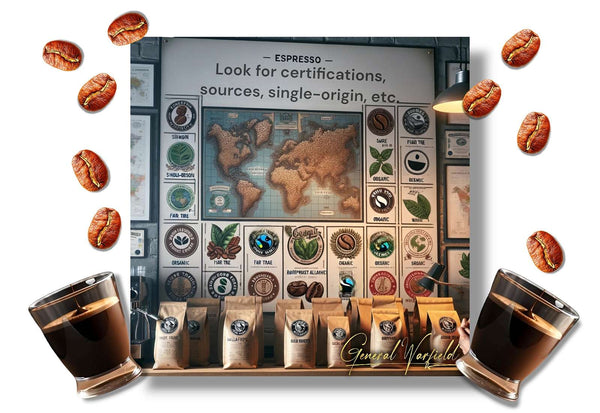
When shopping for espresso beans, you may come across various labels and certifications that indicate the origin and quality of the beans. Understanding these labels will help you make an informed decision and ensure that you're purchasing beans that meet your standards. Here are some common labels and certifications to look out for:
- Single-Origin
A single-origin label indicates that the beans come from a specific region or farm. These beans offer a unique flavor profile that reflects the terroir of the origin. Single-origin beans are often favored by coffee enthusiasts who appreciate the distinct characteristics of different regions.
- Fair Trade
Fair Trade certification ensures that the beans have been produced in an ethical and sustainable manner. It guarantees that the farmers receive fair prices for their crops and promotes social and environmental responsibility. Choosing Fair Trade beans supports the livelihoods of coffee farmers and contributes to a more sustainable coffee industry.
- Organic
Organic certification indicates that the beans have been grown without the use of synthetic pesticides, herbicides, or fertilizers. Organic farming practices promote environmental sustainability and protect the health of farmers and consumers. If you prioritize organic products, look for the organic label when purchasing espresso beans.
- Rainforest Alliance
The Rainforest Alliance certification focuses on promoting sustainable farming practices, biodiversity conservation, and improving the well-being of farmers and communities. Beans with this certification are sourced from farms that meet the organization's rigorous standards. By choosing Rainforest Alliance certified beans, you're supporting efforts to protect the environment and improve the livelihoods of coffee farmers.
When evaluating coffee bean labels and certifications, consider your personal values and priorities. Whether you're passionate about supporting fair trade practices, protecting the environment, or simply seeking the best flavor, there are beans available that align with your values.
Where to Buy High-Quality Espresso Beans
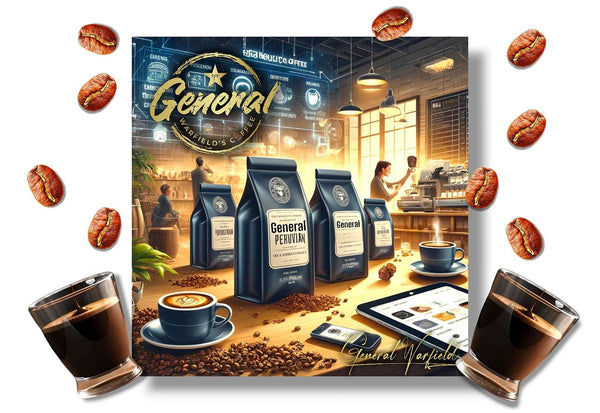
Now that you have a better understanding of the factors to consider when selecting espresso beans, you may be wondering where to find high-quality options. Look no further than General Warfield’s Coffee. Our carefully curated selection of organic, fairtrade, specialty-grade coffees is available directly through our website. Whether you're looking for 'how to choose beans for espresso' or the 'best roast level for espresso,' our selection is tailored to meet your needs.
Embrace the flavors of our whole bean Peruvian, Colombian, Ethiopian Yirgacheffe, and our blend of Guatemala and Brazilian coffees, all roasted to perfection from medium to medium-dark. Visit us online to explore our offerings and discover the ideal coffee for your next espresso adventure.
Here are some other of the best places to buy espresso beans that we have selected:
- Local Specialty Coffee Shops
Local specialty coffee shops often roast their beans in-house or source them from reputable roasters. These shops have a wide selection of beans, and the staff can provide expert advice and recommendations based on your preferences. Supporting local businesses also contributes to the growth of your community's coffee culture.
- Online Specialty Coffee Retailers
Online specialty coffee retailers, such as General Warfield’s Coffee, offer a convenient way to explore a wide range of beans from different origins and roasters. These retailers often provide detailed descriptions of each bean, helping you make an informed decision. Look for online retailers that prioritize freshness and roast their beans to order, ensuring you receive the highest quality product.
- Directly from Roasters
Many coffee roasters offer their beans for sale directly to consumers. This allows you to purchase beans that have been freshly roasted and shipped directly from the source. Buying directly from roasters also gives you the opportunity to learn more about their farming and roasting practices, enhancing your overall coffee experience.
- Coffee Subscriptions
Coffee subscriptions are an excellent option for those who want to explore a variety of beans and roasters. Subscriptions often deliver freshly roasted beans to your doorstep at regular intervals, providing a hassle-free way to ensure a constant supply of high-quality espresso beans. Look for subscriptions that allow you to customize your preferences and discover new flavors with each delivery. Try our very flexible coffee subscription plans by visiting General Warfield’s Coffee.
Remember to read reviews and do your research before making a purchase. Look for reputable sellers with positive feedback and a commitment to quality. By choosing reliable sources, you can have confidence in the beans you're purchasing and enjoy a consistently excellent cup of espresso.
Storing and Grinding Espresso Beans for Optimal Freshness
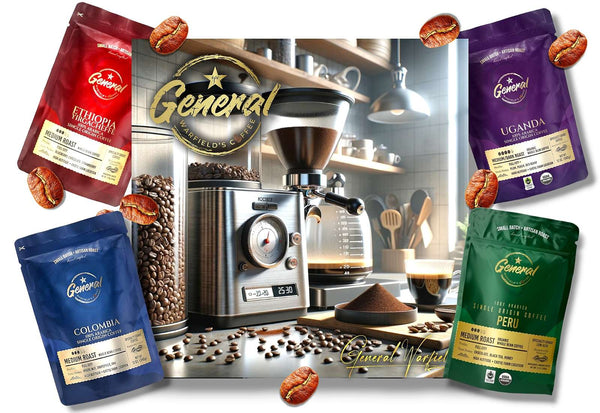
When it comes to grinding for espresso, the grind size is critically important. For our coffees, a fine grind size is recommended. This allows for the right extraction rate, ensuring that the espresso is not over or under-extracted. A fine grind should feel a bit finer than table salt but not as fine as powdered sugar. If you're using a traditional espresso machine, aim for a grind size that allows the espresso to be brewed within 25 to 30 seconds for a balanced extraction. We suggest starting with 18-20 grams of coffee for a double shot, adjusting the grind size until you achieve your perfect shot with a rich crema and full flavor.
To preserve the freshness and flavor of your espresso beans, proper storage and grinding techniques are essential. Here are some tips to ensure that your beans stay at their best:
- Storage
Store your espresso beans in an airtight container, away from light, heat, and moisture. Avoid using transparent containers, as they can expose the beans to light, which can degrade their quality. It's also important to keep your beans away from strong odors, as they can absorb unwanted flavors. Consider investing in a dedicated coffee storage container with a one-way valve to release excess carbon dioxide while preventing oxygen from entering.
- Grinding
Grinding your beans just before brewing ensures maximum freshness and flavor. Invest in a good-quality burr grinder, as it provides a more consistent grind compared to blade grinders. The grind size for espresso should be fine and uniform, resembling granulated sugar. Experiment with different grind settings to find the perfect extraction time and balance of flavors.
- Dosage
When brewing espresso, the dosage of coffee grounds plays a significant role in achieving the desired taste. Aim for a ratio of 1:2, where the amount of coffee grounds is twice the weight of the final espresso output. Adjust the dosage according to your preference for strength and intensity. Keep in mind that a higher dosage may result in a longer extraction time and potentially more bitterness.
By following these storage and grinding techniques, you can ensure that your espresso beans retain their freshness and flavor for longer. Remember to only grind the amount of beans you need for each brewing session to minimize exposure to air and moisture.
Experimenting with Different Bean Blends and Origins

Now that you have all the tools and knowledge to choose the perfect beans for your espresso, it's time to start experimenting! Don't be afraid to step out of your comfort zone and try different blends and origins. Each bean brings its own unique flavors and characteristics to your cup of espresso, providing a world of possibilities to explore.
Start by trying different blends that combine beans from various origins. Blends offer a balanced and harmonious flavor profile that can be enjoyed by a wide range of coffee enthusiasts. Experiment with different ratios of Arabica and Robusta beans to find the perfect balance of acidity, body, and crema.
Once you’ve mastered the basics, the next step is experimenting with various blends and origins to discover the perfect match for your taste. Each origin has its own distinct flavor profile, influenced by factors such as soil, climate, and processing methods. From the bright and fruity flavors of African beans to the rich and chocolatey notes of South American beans, there's a whole world of flavors waiting to be discovered.
Keep a coffee journal to document your brewing methods, bean selections, and tasting notes. This will help you track your preferences and identify the flavors and characteristics you enjoy the most. Share your experiences with fellow coffee lovers and engage in discussions to expand your knowledge and appreciation for espresso.
In conclusion, choosing the perfect beans for your espresso coffee is a journey of exploration and experimentation. Consider the flavor profiles, roast levels, origins, and certifications that align with your taste preferences and values. Invest in high-quality beans, store them properly, and grind just before brewing to maximize freshness and flavor. With each cup of espresso, you'll embark on a flavorful adventure that delights your taste buds and satisfies your coffee cravings. Enjoy the process and savor every sip of your perfectly brewed espresso. Ready for a caffeinated journey that transcends the ordinary?
Ready for a Caffeinated Journey?
Browse our premium selection at General Warfield’s Coffee today and experience the rich, unique profiles we’ve carefully curated.
Click Shop Now! or click image above to begin a journey you won't forget.



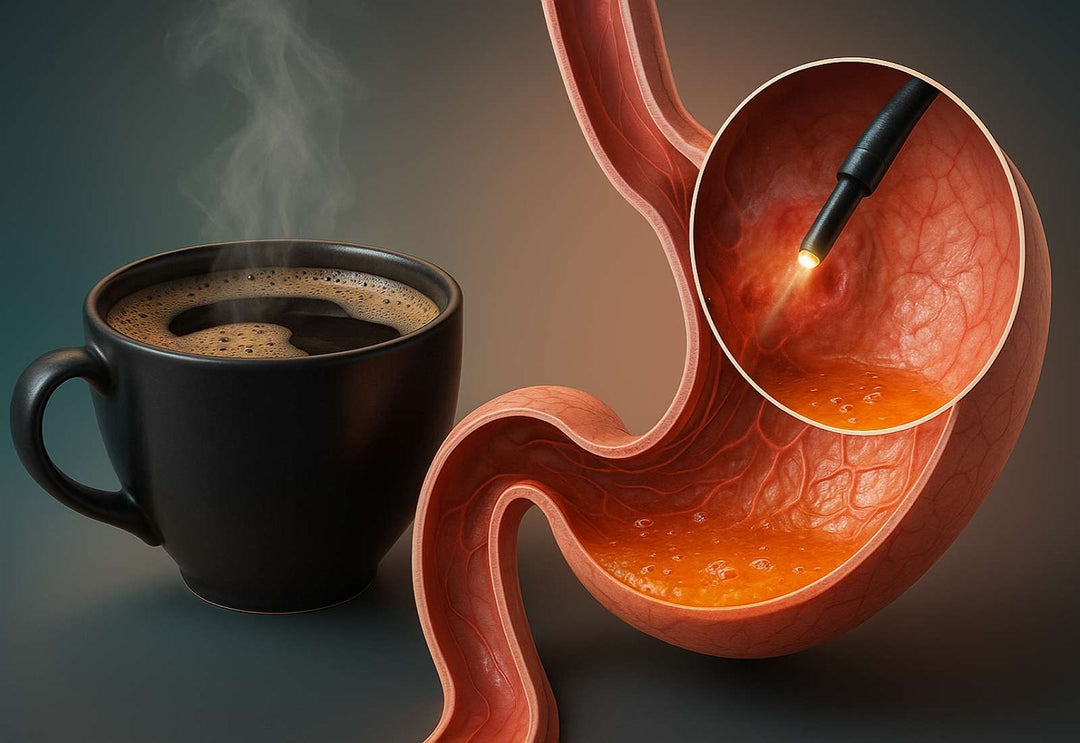
Leave a comment